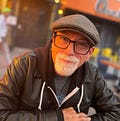What I read: Practise ‘intuitive eating’ and feel a lot happier about food by Charlotte H. Markey. Published February 28, 2023.
Over the last few months, I’ve been pondering the idea of intuitive living. Some people have written about this topic. Frequently there is a correlation with eating practices when the word intuitive is invoked. This article does that too.
But for whatever reason, when I read this article by Charlotte H. Markey a bunch of dots began to become connected in my brain. Suddenly, things began to gel around my thinking about how one might live better intuitively generally and not just regarding one’s eating habits.
I must admit that historically whenever I’ve encountered the word intuitive, I’ve balked. Merriam-Webster’s dictionary defines intuitive as “possessing or given to intuition or insight” and “known or perceived by intuition.” Words like that make me somewhat uncomfortable because it feels a bit too new age adjacent. I align much of that stuff with nebulous feel good language that does little to actually move people forward in realistic and tangible ways.
Yes, that’s a bias. I admit that. I’m not outright discounting spirituality or that there are other such intangibles that might indeed have merit. But I’m also not ready to fully embrace such things either.
Perhaps because this article is founded upon research data, I appear to have had a change of heart regarding the word intuitive. My brain seems to now be more comfortable acknowledging that there are internal processes going on inside us that are difficult for us to fully understand. Those processes might tap into a collection of personal knowledge and experience to produce better intuitive decisions. Maybe we can produce meaningful answers to the eternal “what do I do with my life now?” question even if I can’t point to a specific data point and claim I’ve got my justifications for my newfound confidence in intuitiveness nailed down.
I’ve written before about my tussles with the lifelong habit of believing I can somehow guide my future optimally through the use of detailed goals and associated task planning. Over time, I’ve had too many dashed hopes that resulted from a robust bout of detailed life planning. At least I’ve abandoned believing that such planning works for me, but replacing it with something that does actually work for me hasn’t been easy.
Enter intuitive living. At least that’s where my thinking is headed nowadays.
Markey discusses in her article the contrasts between strict diets, often referred to as restrained eating by researchers, emotional eating, and a more psychologically and physically healthy style of eating termed intuitive eating.
Intuitive eating hearkens back to those early-life experiences of eating when there was more of a focus on physical needs and eating to satiation. The objective is not to eat potato chips for three meals a day because that is what you’d most like to do, but to allow yourself permission to eat potato chips. Typically, once ‘forbidden fruit’ such as these are viewed as ‘allowed’, they become less appealing and don’t have the same power as they once did.
For me, much of the self-help, productivity, and success advice content that’s promoted by a plethora of sources can be a parallel to restrained eating. In a sense, it’s a type of restrained living. Sure, things like diets work for a while, as do some restrained living approaches, but for how long? Not very long usually.
That’s why so many people consume mountains of self-help literature and content. They’re constantly trying to get that hard hitting blast of satisfaction that accompanies making lists, creating goals, and ticking off tasks from a checklist. I’ve certainly done that, to the point of it seriously blocking progress in my life.
When I reflect, far too often I realize I should have been simply doing the essential life task in front of me instead of yet again crafting some new goal strategy. I eventually came to know intellectually that the exercise was doomed, but I’d do it again anyway. After all, could all those self-help experts be wrong? Yes, I think they’re wrong. Or at least their answer is but a minor tool in our quivers when we’re aiming for a better self or improved life.
Another dot connection moment occurred when I read a recent post by Oliver Burkeman, Find the life task. Burkeman discusses the concept of the “life task” related to Carl Jung’s realization that to clear the path when one is undecided or unmotivated one should ask themselves “what’s the life task here?” What is the core essential thing one needs to do to move one ahead in life based upon the situation one finds themselves in at the moment? That question is not about succumbing to external pressures, but rather it's about determining what is the essential thing one must now do?
But the point about a life task is that it's something life is demanding, so it might or might not overlap with all those external and internal pressures and ideals.
That sounded to me a lot like determining intuitively what the next step should be.
This post is only the beginning of my thinking about this subject. There are so many years of programmed bias still banging around in my head that it’s going to take a while to dislodge it enough to think entirely clearly about this topic. But if feels like I’m on the right path. My intuition tells me so.
You can use this link to access all my writings and social media and ways to support my work.


